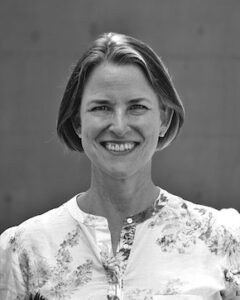The messenger
by Alison Jean Lester
“All the building menace of the best Stephen King told with the style and compassion of Ann Patchett.” Chris Huntington, author of Mike Tyson Slept Here
I’m standing alone in the kitchen trying to pour chocolate batter into a cake pan without getting any on the counter. I’m also trying to think of a way into a conversation with my wife about children. It’s still a few hours before I need to pick her up from the airport, so I can keep chipping away at the problem for a while.
Liv doesn’t want children. We’ve been together since 1986, over five years, and we’ve almost never fought, but we’ve fought about that. It’s not that I want them so badly. I just want to know why she doesn’t want them, and she won’t tell me.
The sound of feet on the back steps drags me back into the room, and I wonder why there is no knock. I go to the door and open it. The man I see through the glass of the storm door is athletic, very gently balding, with shiny gold curls behind his ears, and he is lighting the candles on a chocolate cake of his own, although his is clearly professionally made. The November day is cold and flat, so the flames don’t waver much. He looks up at me and goes back down two steps so I can open the storm door and lean my head out.
“Can I help you?”
“Where is she?” he asks, smiling as if we share a happy secret.
“She who?”
“Liv!”
I look at my watch. “She’s flying back from Norway. It’s still a while before she lands. Who are you?”
“Morten!” he shouts. Again the impression of some assumed, shared knowledge, some wonderful surprise. I’m supposed to shout, “Morten! Good God, man, come on in!”
“Morten!” he repeats. “Liv’s half-brother, Morten! And you must be Leo!”
“Yes,” I say. “Well, that’s strange…”
“Look,” he says, “can I just come in and put out these candles?” Puddles of pink and blue wax are forming in the frosting. Of course there’s nothing stopping him from putting out his candles right there on the step, but this reminds me to put my own cake in to bake, so I let the stranger into the house.
I straighten up from the cold oven feeling stupid. I forgot to preheat it. It’s not worth turning it on now that there’s already a great-looking chocolate cake on the table. The man straightens up from blowing out his candles and we turn to face each other. Something about his large frame, his straight nose and his obviously expensive corduroy trousers puts me on alert. I don’t recognize his type right away; I can’t read anything in him but his charismatic momentum. My own body language, on the other hand – my tendency to lean forward rather than back when preparing a question – tells him everything he needs to know about my fundamental aim to please. The candles on his rich cake smolder.
“Um,” I say, and then take the leap. “Why didn’t I know Liv had a brother?”
He opens his large hands. “As you can imagine,” he says, lifting his impressive shoulders in a gesture intended to convince me of the reasonable, affable heritage he shares with my wife, “I am as interested as you in the answer to that question.” He expects me to laugh, but I don’t. I smile, though, and I nod. I raise my elbows and plant my palms on the hard edge of the counter behind me. My kitchen counter. My kitchen. My wife. His sister?
Well, brothers and sisters, we spend long moments… years… in plain view of each other, but out of earshot, until we finally truly encounter each other. And then, of course, hello is foolish.”
“May I sit?” he asks, and I wave a hand with what I hope is just the right blend of hospitality and suspicion. He nods his thanks and pulls a chair into position by the kitchen table. He rests his left arm on the table. The other is free to gesticulate. He waves it to announce an abstract concept.
“Brothers and sisters,” he begins, “we never say hello, am I right?”
“I’m an only child,” I say.
“I see. Yes. Well, brothers and sisters, we spend long moments… years… in plain view of each other, but out of earshot, until we finally truly encounter each other. And then, of course, hello is foolish.” His face is calm, confident, settled. I’m still waiting for the ball to land on a roulette wheel of appropriate attitudes. What he’s saying sounds like bullshit, but I need to hear more to be sure. His Norwegian accent is obvious, but not heavy. I’ve always been impressed by Norwegians’ command of vocabulary. ‘Earshot’. He continues. “And of course we do not expect to say goodbye, not until death anyway, and even then we generally do not have the chance. We die in obscurity, having traveled beyond each other.” He looks wistful, and also pleased. He extends his left hand to toy with the wick of a candle, then considers the black residue on his thumb and finger before rubbing his fingers together.
Five seconds of silence, which don’t appear to make him uncomfortable. “So…” I suggest, leaning forward. I put my hands in my jeans pockets.
“So!” he says, snapping back with renewed vigor. “So, Liv and I met abruptly, therefore we had to say hello. Simply put, it is this. We have the same father, not mother. It was supposed to be a secret, but we found out. We disagreed about our father, we parted in pain. The whole episode – the hello and the goodbye – was an enormous shock to me. To us both. It has been twelve years today. I thought I’d check in.”
“Twelve years?”
“Yes.”
“So how—”
He distracts me from asking how he knows my name by asking, “When did you say she’d be back?”
“I didn’t say.” I look at my watch, and it’s time for me to find out if the plane is on time. I say, “Let me call the airline.”
Morten looks around the room while he waits. He’s clearly assessing the kitchen, which means he’s assessing me. Us. I turn my back to him when I finally have someone to speak to.
When I hang up I turn back around and tell him, “The plane is about an hour late. I don’t have to leave for the airport as soon as I thought.” Hands on hips, I stare at the linoleum. I want to be alone. I have a confession, about children, to construct. A secret to reveal to Liv. I need to get it right in my head. Strangely, though, I also want this visitor to go on talking. I want to understand who he is, but that’s not all. He’s intelligent, quick, entertaining – the sort of philosopher-athlete that isn’t as common in the States as it is in Northern Europe and Scandinavia. Guys like him intimidate American men like me. We want them to like us.
Eyebrows up to indicate a general willingness, lips slightly pursed to show concern, he makes it clear that the next move is mine.
“Coffee?” I say.
From Glide (Bench Press, £9.99)
 Alison Jean Lester was born in Los Angeles in 1966 to a British mother and an American father. She spent many of her formative years in Massachusetts before studying, working and writing in Indiana, China, Washington DC, Italy, Taiwan, Japan and Singapore, and now lives in Worcestershire. She is the author of the novels Lillian on Life and Yuki Means Happiness, the collections Locked Out: Stories Far from Home and Restroom Reflections: How Communication Changes Everything, and the memoir Absolutely Delicious: A Chronicle of Extraordinary Dying, a finalist in the Indie Excellence Books Awards. Glide is published in paperback and eBook by Bench Press. Its narrator Leo is a photographer, and the reader is invited to connect with the mood of the narrative through the photographs by Andrew Gurnett placed throughout the book. Not a literal representation of the setting or events, they offer a moment to pause, to feel, to imagine.
Alison Jean Lester was born in Los Angeles in 1966 to a British mother and an American father. She spent many of her formative years in Massachusetts before studying, working and writing in Indiana, China, Washington DC, Italy, Taiwan, Japan and Singapore, and now lives in Worcestershire. She is the author of the novels Lillian on Life and Yuki Means Happiness, the collections Locked Out: Stories Far from Home and Restroom Reflections: How Communication Changes Everything, and the memoir Absolutely Delicious: A Chronicle of Extraordinary Dying, a finalist in the Indie Excellence Books Awards. Glide is published in paperback and eBook by Bench Press. Its narrator Leo is a photographer, and the reader is invited to connect with the mood of the narrative through the photographs by Andrew Gurnett placed throughout the book. Not a literal representation of the setting or events, they offer a moment to pause, to feel, to imagine.
Read more
alisonjeanlester.com
Twitter: @A_J_Lester
Instagram: a_j_lester
Buy from Hive
Author portrait © Andrew Gurnett
Andrew Gurnett is a photographic artist based in Worcestershire.
andrewgurnett.com
Twitter: @AndrewGurnett
Instagram: gurnettphotoart




